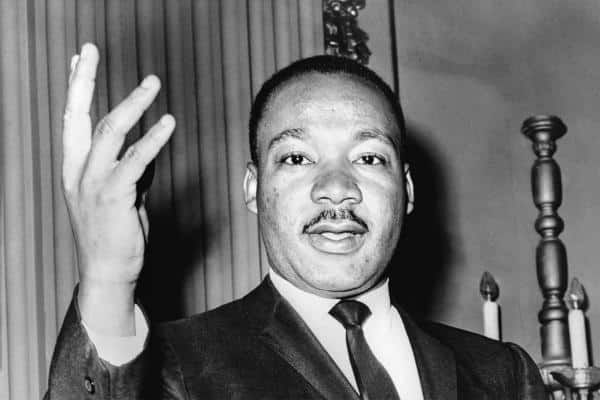MLK Understood the Threat of Communism

As America remembers Reverend Martin Luther King Jr.’s legacy as a giant of the civil rights movement, his opposition to communism also bears studying. In a 1953 sermon entitled, “Communism’s Challenge to Christianity,” King argued that the struggle between Marxist forces and the free world was “one of the most important issues of our day.” His words continue to ring true today.
While much has changed in the 71 years since Martin Luther King Jr. made this assessment, the specter of communism continues to haunt. Today, despots inspired by Marx, Stalin, and Mao threaten global security in a way that we have not seen since the Cold War. North Korea has deployed over 12,000 troops to fight in Eastern Europe. Russia is, in the words of opposition leader Vladimir Kara-Murza, an “archaic, repressive, KGB-led regime” that threatens to destabilize Eurasia. Meanwhile, China carries out espionage, threats, and cyberattacks against the West while oppressing millions of Uyghurs at home.
So, what can we learn from Martin Luther King Jr. on this global threat, 71 years later?
King’s critique of communism is profound. He begins by taking communism seriously as an intellectual and ethical framework for understanding history, politics, and society and as “Christianity’s most formidable competitor” at the time. He mistakenly suggests that the 200 million people living under communism in his time believed the dogma, but he rightly notes that communism is always imposed by force, violence, and murder, and never at the ballot box. He concludes that “communism and Christianity are at the bottom incompatible” for three reasons:
“In the first place … it is avowedly secularistic and materialistic …[and] atheistic.” Communism believes that all of life is simply atoms and chemicals (materialism) and that there is no fundamental ‘human nature’ nor is there anything spiritual or transcendent. Thus, culture, society, and morality are just social constructs as are institutions such as the family. None of these has a moral basis. Thus, kinship, love, ethics, and reverence are all just ‘figments of the imagination’ that may be used by the communist elite for their own purposes.
In our lifetime, Beijing’s ongoing attempts to control and remake society, from the Cultural Revolution to today’s “New Socialist Thought,” are rooted in this view. So too is the mystical quasi-religious Juche of North Korea where elites brainwash the citizenry into placing faith and allegiance in the Great Leader above all.
“In the second place, the methods of communism…[include] force, violence, murder, and lying…” King observed that every communist revolution began not through popular sovereignty or democratic mechanisms, but by revolutionary violence led by a small group of elites. Those communist elites stay in power through distortions of reality, control of the media, and state-sponsored terrorism. The revolution justifies any means used toward the end of staying in power (i.e., the end justifies the means), and during the Cold War we saw that in Cambodia, Vietnam, Ethiopia, Congo, and elsewhere.
This brute force was most recently on display in Venezuela, where the July 2024 elections were stolen despite an estimated 70% of the populace voting for the opposition candidate. The use of intimidation, incarceration, torture, disappearance, and turning the national military on the citizenry is the playbook of today’s Cuba, Venezuela, Nicaragua, and other Marxist-legacy regimes.
Third, according to King, “the end of communism is the state.” Although Karl Marx fantastically wrote that the state, after accruing total power, would dissolve away, the communist reality is that the state takes more and more power and becomes an end unto itself. The objective of the never-ending revolution ends up being a marvelous lifestyle for elites and failed social and economic experiments resulting in humiliation and destitution for the masses.
King contrasted the totalitarian ends of communism with the limits and opportunities found in free societies. In Western democracies there is a social contract whereby citizens expect basic security and justice from public authorities. The moral claims to that justice rest largely in the West’s Judeo-Christian heritage, which emphasizes the inherent dignity of the individual, the value of institutions such as the family and religion, and the willingness to point out the sins of pride, prejudice, and tyranny.
For Martin Luther King, Jr., and for “we the people” of the United States, there can be no reconciling of the vastly different moral foundations of Western civilization and the immoral ideas and heartless tactics of communism: “They represent diametrically opposed ways of looking at the world…”
Elsewhere, King wrote that “no man is an island,” so all of us have a responsibility to call out injustice. At the time he was speaking of Birmingham, Alabama, arguing, “Injustice anywhere is a threat to justice everywhere. We are caught in an inescapable network of mutuality, tied in a single garment of destiny. Whatever affects one directly, affects all indirectly.”
Whether in facing Russia’s aggression against Ukraine, China’s concentration camps, Maduro’s gloating over a stolen election, or Nicaragua stripping priests of their citizenship, it is time to heed King’s call to thwart the evil tactics and ideas of communism.

